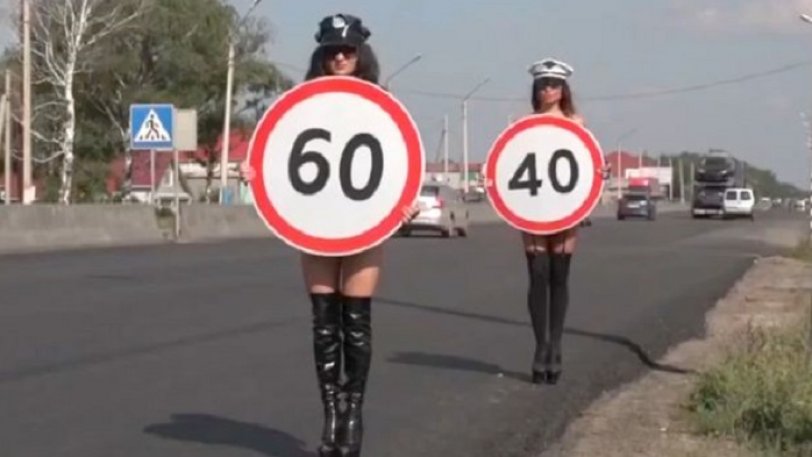Russia uses topless models to enforce speed limit
Road safety campaign group claims bizarre method is best way to reduce 30,000 annual road deaths

A free daily email with the biggest news stories of the day – and the best features from TheWeek.com
You are now subscribed
Your newsletter sign-up was successful
Topless models have been sent onto the streets of Russia in an attempt to slow down speeding drivers.
The bizarre idea has been launched by a Russian road safety campaign in an effort to reduce the 30,000-a-year deaths on Russia's roads, says the Daily Mirror.
The "female road safety assistants", dressed only in boots and knickers, hold large speed signs over their chest while walking down the roads on Russia's Novaya Zemlya island.
The Week
Escape your echo chamber. Get the facts behind the news, plus analysis from multiple perspectives.

Sign up for The Week's Free Newsletters
From our morning news briefing to a weekly Good News Newsletter, get the best of The Week delivered directly to your inbox.
From our morning news briefing to a weekly Good News Newsletter, get the best of The Week delivered directly to your inbox.
A spokesman for the campaign, entitled Avtodrizhenia, which staged the trial, said that "most speeding drivers, the majority of whom happened to be men, slowed down to admire the female road safety assistants".
There were also no reported accidents due to distracted driving, the campaign added.
The experiment was first trialled in 2013 and has been revived as part of a new national debate on reducing deaths on Russia's roads, says the Daily Mail.
The idea has won some unlikely support, with the area's elderly population telling reporters that they were happy the speed was being enforced as they were terrified for their lives when crossing the road.
A free daily email with the biggest news stories of the day – and the best features from TheWeek.com
"Drivers do not let us cross. Some of them do, but many others just fly past. They even shout at us – 'why are you walking here?' Can you believe it?" said one female pensioner.
One of the models who stripped off for the experiment said: "Our drivers usually do not slow down when they pass a village or a settlement even though there are speed limit signs by the road. So we have to make them do it."
-
 Why are election experts taking Trump’s midterm threats seriously?
Why are election experts taking Trump’s midterm threats seriously?IN THE SPOTLIGHT As the president muses about polling place deployments and a centralized electoral system aimed at one-party control, lawmakers are taking this administration at its word
-
 ‘Restaurateurs have become millionaires’
‘Restaurateurs have become millionaires’Instant Opinion Opinion, comment and editorials of the day
-
 Earth is rapidly approaching a ‘hothouse’ trajectory of warming
Earth is rapidly approaching a ‘hothouse’ trajectory of warmingThe explainer It may become impossible to fix
-
 Epstein files topple law CEO, roil UK government
Epstein files topple law CEO, roil UK governmentSpeed Read Peter Mandelson, Britain’s former ambassador to the US, is caught up in the scandal
-
 Iran and US prepare to meet after skirmishes
Iran and US prepare to meet after skirmishesSpeed Read The incident comes amid heightened tensions in the Middle East
-
 Israel retrieves final hostage’s body from Gaza
Israel retrieves final hostage’s body from GazaSpeed Read The 24-year-old police officer was killed during the initial Hamas attack
-
 China’s Xi targets top general in growing purge
China’s Xi targets top general in growing purgeSpeed Read Zhang Youxia is being investigated over ‘grave violations’ of the law
-
 Panama and Canada are negotiating over a crucial copper mine
Panama and Canada are negotiating over a crucial copper mineIn the Spotlight Panama is set to make a final decision on the mine this summer
-
 Why Greenland’s natural resources are nearly impossible to mine
Why Greenland’s natural resources are nearly impossible to mineThe Explainer The country’s natural landscape makes the task extremely difficult
-
 Iran cuts internet as protests escalate
Iran cuts internet as protests escalateSpeed Reada Government buildings across the country have been set on fire
-
 US nabs ‘shadow’ tanker claimed by Russia
US nabs ‘shadow’ tanker claimed by RussiaSpeed Read The ship was one of two vessels seized by the US military